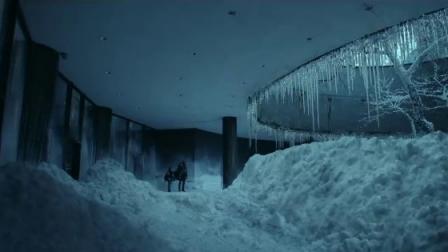When it's Station 11.
What's that? A new HBO show which they dropped a trailer for earlier this week.
Initally we dismissed it. While it's being described by some as "sci-fi" we could see no trace of it in the trailer.
The story is post apocalypse and sometimes those are sci-fi, either by virture of the nature of the apocalypse or the far future setting with advanced technologies.
Neither seemed to apply here. Current time setting and a flu epidemic.
But throughout the week it continued to appear in sci-fi news and we were asked to look at it again because it had won an Arthur C. Clarke Award and that's sci-fi, right?
It did indeed win a Clarke in 2015 and also several other non sci-fi awards.
So we threw spoiler caution to the wind and read through its full plot entry in wikipedia looking for any potentially hidden signs of sci-fi.
Still none.
But one of the subject headings in its wikipedia entry is "Genre".
Curious. Genre is not normally something which warrants an entire section. It's usually a short and often one word label which is functionally descriptive in its own right. Not so here.
The author, Emily St. J Mandel is of the same mind as us which she expressed in a twitter response to a Washington Post article:
@RonCharles Great piece. I actually don't think of Station Eleven as sci-fi, but am fully prepared to concede that I may be alone in this...
Because the article claimed that hers was:
one of the very few sci-fi novels that have ever been finalists for the NBA [National Book Award, US].
In followup emails with the author of that article she revealed that simply by virtue of her work being set in the near future, it had qualifed for sci-fi categorization by award people.
I was surprised to discover that if you write literary fiction that’s set partly in the future, you’re apparently a sci-fi writer.
Write a piece of fiction. Set it tomorrow. It's sci-fi.
That doesn't add up.
Emily has nothing against sci-fi and isn't bothered by being labelled as a sci-fi author but words have meaning and when misapplied can create problems.
My only objection to these categories is that when you have a book like mine that doesn’t fit neatly into any category, there’s a real risk that readers who only read ‘literary fiction’ won’t pick it up because they think they couldn’t possibly like sci-fi, while sci-fi readers will pick up the book based on the sci-fi categorization, and then be disappointed because the book isn’t sci-fi enough.
It looks like it could be good viewing, but we agree with both the author's categorization and concerns about miscategorization.
[ Main Image: Station 11 teaser. Credit: HBO Max via YouTube. ]
References
Charles, Ron (October 15, 2014). National Book Awards Finalists Announced. Washington Post.
Charles, Ron (October 15, 2014). Sorry, Emily St. John Mandel: Resistance is futile. Washington Post.
HBO Max (November 3, 2021). Station Eleven | Official Teaser | HBO Max. YouTube.
Mandel, Emily St. J [@EmilyMandel] (October 16, 2014). @RonCharles Great piece. Twitter.
Rankin, Seija (November 2, 2021). Station Eleven first look glimpses the world before and after a devastating flu pandemic. Entertainment Weekly.
Wikipedia. Station Eleven. (viewed November 7, 2021)
- Log in or register to post comments








